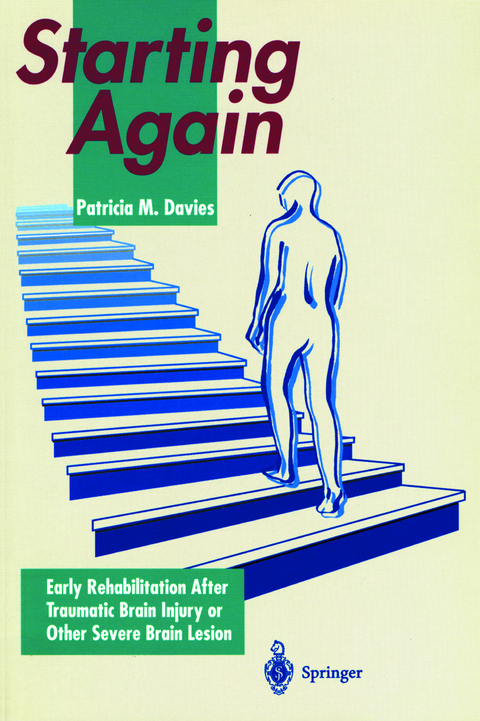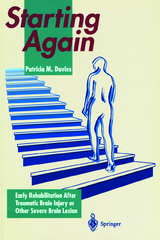Starting Again
Springer Berlin (Verlag)
978-3-540-55934-4 (ISBN)
Dank der modernen Notfallmedizin überleben heute die meisten Unfallopfer selbst mit schweren traumatischen Hirnverletzungen. Wie den neurologisch geschädigten Patienten - meist jüngeren Menschen - bei ihrer Rückkehr in ein selbständiges Leben geholfen werden kann, zeigt Patricia M. Davies in dem Buch Starting Again. Ihr Therapieansatz ist praxisorientiert und ganzheitlich angelegt: Dieses neue Konzept setzt eine enge Zusammenarbeit aller Betreuer voraus: Physiotherapeuten, Ergotherapeuten, Sprachtherapeuten,Ärzte und Pflegekräfte werden davon gleichermaßen profitieren.
What does "Starting Again" mean to the many different people this book reaches out to? This positive title may draw the reader to enquire why an immensely experienced physiotherapist is considering starting again. Perhaps it challenges patients to rethink their own limitations, or therapists to reconsider their own management strategies. Does it refer to a change in life for head-injured patients and their carers, or does it hint at a fresh approach to old problems? Since "Steps to Follow" and "Right in the Middle", Pat Davies has not been idle. She has remained aware of what may be new and worthwile in therapy around the world, incorporated it into her own vast experience and taken ideas, concepts and techniques back to her patients to test their clinical validity. This is, therefore, not a pedestrian text but one brimming with new ideas for immediate use. That in itself should be a message of hope for all involved in the consequences of head injury. The future will always hold new and better management strategies, the understanding of the nature and consequences of head injury will improve, and thus there should never be limits placed on what patients can achieve. Reduced to its simplicity and presented in modem day thinking, the nervous system is a neural network. It requires input for output, yet it possesses a delicate, powerful, inherent feedback system so it can drive itself optimally, test itself out, learn and adapt.
Patricia M. Davies has drawn, in writing this book, on her long years of experience and unique opportunities for exchanging knowledge with international experts in the field. The book is essentially a practical guide. The author refrains from discussing at length the different hypotheses related to prognosis and recovery of function. Instead, she concentrates on what can actually be DONE to help the patient during routine nursing procedures as well as in special therapy sessions.
1 Getting in Touch Again.- Disturbances of Tactile Input.- Problems Related to Disturbed Tactile/Kinaesthetic Input.- Enhancing Learning in the Treatment Programme.- Choice of Therapeutic Intervention.- Therapeutic Guiding.- Important Considerations for Guiding.- Choosing a Suitable Task.- Ways in Which Guiding Can Be Implemented.- Guiding Tasks in Different Clinical Situations.- The Problem of Incontinence.- Avoiding the Negatives Associated with Post-traumatic Epilepsy.- Conclusion.- 2 Early Positioning in Bed and in the Wheelchair.- Turning and Positioning in Bed.- Sitting Out of Bed.- Transferring the Patient from Bed to Wheelchair.- Position in the Wheelchair.- Propelling the Wheelchair Independently.- The Importance of Turning and Positioning the Patient.- A Case in Point.- 3 Moving and Being Moved in Lying and Sitting.- Requirements for Efficient Muscle Action.- Possible Lengthening Mechanisms.- The Importance of Mobilizing the Nervous System.- Important Movement Sequences.- Maintaining Full, Painfree Range of Motion in the Upper Limbs.- Regaining Active Control of the Arm.- Mobilizing the Trunk and Lower Limbs.- Conclusion.- A Case in Point.- 4 Early Standing.- The Importance of Standing the Patient.- Considerations Before Standing the Patient.- Standing the Patient Upright.- Moving While Standing.- Conclusion.- A Case In Point.- 5 Reanimating the Face and Mouth.- Common Problems and Their Treatment.- Therapeutic Procedures.- Oral Hygiene.- Starting to Eat and Drink Again.- Facilitating Eating.- Drinking.- Prolonged Postacute Tube Feeding.- Learning to Speak Again.- Providing an Alternative Means of Communicating.- Conclusion.- 6 Overcoming Limitation of Movement, Contracture and Deformity.- Reasons for the Development of Contractures.- Overcoming Contractures and Restoring Functional Movement.- Serial Casting.- Surgical Intervention.- Antispastic Drugs and Nerve Blocks.- Management of Fractures and Soft Tissue Injuries.- Heterotopic Ossification.- Considerations for the Prevention of HO.- Overcoming the Problems of Existing HO.- Conclusion.- 7 Towards Attaining Independent Walking: Preparation and Facilitation.- Considerations for Treatment.- When to Start Walking.- A Case in Point.- Preparatory Activities.- The Facilitation of Walking.- Facilitating Standing Up and Sitting Down.- Dealing with Additional Problems Which Prevent Walking.- A Case in Point.- Learning to Go Up and Down Stairs.- Recreational Activities Which Encourage Active Movement.- Conclusion.- References.
| Erscheint lt. Verlag | 26.5.1994 |
|---|---|
| Illustrationen | R. Gierig |
| Vorwort | D. Butler |
| Zusatzinfo | XXVIII, 442 p. 364 illus. |
| Verlagsort | Berlin |
| Sprache | englisch |
| Maße | 155 x 235 mm |
| Gewicht | 795 g |
| Themenwelt | Geisteswissenschaften ► Psychologie ► Klinische Psychologie |
| Medizin / Pharmazie ► Gesundheitsfachberufe | |
| Medizin / Pharmazie ► Medizinische Fachgebiete ► Neurologie | |
| Medizin / Pharmazie ► Medizinische Fachgebiete ► Psychiatrie / Psychotherapie | |
| Medizin / Pharmazie ► Physiotherapie / Ergotherapie ► Rehabilitation | |
| Schlagworte | Bobathsche Behandlung • Frührehabilitation • Hirngeschädigte • Hirnverletzung • Intensivbetreuung • Neurologie • neurology, intensive care • Neurorehabilitation • nursing • recovery of neurological functions • Schädel-Hirn-Trauma • Schädelverletzung |
| ISBN-10 | 3-540-55934-5 / 3540559345 |
| ISBN-13 | 978-3-540-55934-4 / 9783540559344 |
| Zustand | Neuware |
| Haben Sie eine Frage zum Produkt? |
aus dem Bereich




